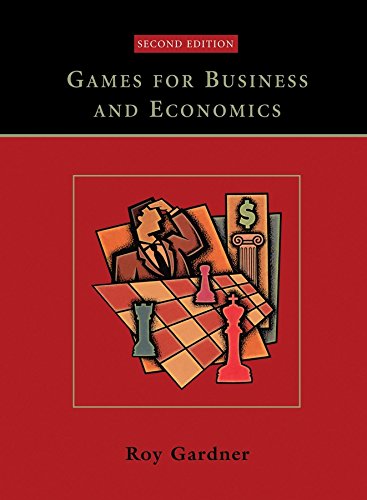Best economics game
If you looking for economics game then you are right place. We are searching for the best economics game on the market and analyze these products to provide you the best choice.
Best economics game
1. Theory of Games and Economic Behavior: 60th Anniversary Commemorative Edition (Princeton Classic Editions)
Description
This is the classic work upon which modern-day game theory is based. What began more than sixty years ago as a modest proposal that a mathematician and an economist write a short paper together blossomed, in 1944, when Princeton University Press published Theory of Games and Economic Behavior. In it, John von Neumann and Oskar Morgenstern conceived a groundbreaking mathematical theory of economic and social organization, based on a theory of games of strategy. Not only would this revolutionize economics, but the entirely new field of scientific inquiry it yielded--game theory--has since been widely used to analyze a host of real-world phenomena from arms races to optimal policy choices of presidential candidates, from vaccination policy to major league baseball salary negotiations. And it is today established throughout both the social sciences and a wide range of other sciences.
This sixtieth anniversary edition includes not only the original text but also an introduction by Harold Kuhn, an afterword by Ariel Rubinstein, and reviews and articles on the book that appeared at the time of its original publication in the New York Times, tthe American Economic Review, and a variety of other publications. Together, these writings provide readers a matchless opportunity to more fully appreciate a work whose influence will yet resound for generations to come.
2. Games Business Economics 2e
Description
Whether you're a veteran in the business game or have just sat down to play, this book will teach you the importance of rules and how to use them to your advantage. Here you can learn the basic strategies for being competitive in a variety of situations, from the blackjack table to the boardroom table. Pull up a chair and prepare to solve gaming problems as they relate to the business and economic environments today.3. A Survey Of Dynamic Games In Economics (Surveys on Theories in Economics and Business Administration)
Description
This book provides readers with a comprehensive survey of models of dynamic games in economics, including an extensive coverage of numerous fields of applications. It will also discuss and explain main concepts and techniques used in dynamic games, and inform readers of its major developments while equipping them with tools and ideas that will aid in the formulation of solutions for problems. A Survey of Dynamic Games in Economics will interest those who wish to study more about the conceptions, approaches and models that are applied in the domain of dynamic games.
4. Law, Economics, and Game Theory
Description
This book considers three relationships: law and economics; economics and game theory; and game theory and law. Economists teach lawyers that economic principles cut across and integrate seemingly different legal subjects such as contracts, torts, and property. Correspondingly, lawyers teach economists that legal rationality is a separate and distinct decision-making process that can be formalized by behavioral rules that are parallel to and comparable with the behavioral rules of economic rationality, that efficiency often must be constrained by legal goals such as equal protection of the laws, due process, and horizontal and distributional equity, and that the general case methodology of economics vs. the hard case methodology of law for determining the truth or falsity of economic theories and theorems sometimes conflict.Economics and Game Theory: Law and economics books focus on economic analysis of judges decisions in common law cases and have been mostly limited to contracts, torts, property, criminal law, and suit and settlement. There is usually no discussion of the many areas of law that require cooperative action such as is needed to provide economic infrastructure, control public bad type externalities, and make legislation. Game theory provides the bridge between competitive markets and the missing discussion of cooperative action in law and economics. How? Competitive markets are examples (subset) of the Prisoners Dilemma, which explains the conflict between individual self-interested behavior and cooperation both in economic markets and in legislative bodies and demonstrates the need for social infrastructure and regulation of pollution and global warming.
Game Theory and Law: Lawsuits usually involve litigation between two parties, not the myriad participants in markets, so the assumption of self-interest constrained by markets does not carry over to legal disputes involving one-on-one bargaining in which the law gives one party superior bargaining power. Game theory models predict the effect of different legal institutions, rights, and rules on the outcome of such bargaining. Game theory also has a natural four-model framework which is used in this book to analyze the law and economics of civil obligation, which consists of torts (negligence), contracts, and unjust enrichment.
5. Game Theory and Economic Modelling (Clarendon Lectures in Economics)
Description
This book examines why game theory has become such a popular tool of analysis. It investigates the deficiencies in this methodology and goes on to consider whether its popularity will fade or remain an important tool for economists. The book provides the reader with some basic concepts from noncooperative theory, and then goes on to explore the strengths, weaknesses, and future of the theory as a tool of economic modelling and analysis. All those interested in the applications of game theory to economics, from undergraduates to academics will find this study of particular value.6. Stock Exchange Game
Feature
The OFFICIAL Release is here!Ages : 10 years to Adults / Players : 2-6
3 Levels of Play - Family Fun, Strategic, and Partners
Fun, Exciting, and Fast-Paced board game you will play for years!
No Stock Knowledge needed to have a great time!
Description
Think of each trip around the board as a year in your life. Investing with the goal of how to retire. Early in the game, purchase risky assets with higher returns, then later in the game sell the risky stocks for safer, more stable investments. "Wheel and Deal" buying and selling stocks to flip profit into more money! The investor to retire with the most assets wins!7. The Theory of Learning in Games (Economic Learning and Social Evolution)
Description
In economics, most noncooperative game theory has focused on equilibrium in games, especially Nash equilibrium and its refinements. The traditional explanation for when and why equilibrium arises is that it results from analysis and introspection by the players in a situation where the rules of the game, the rationality of the players, and the players' payoff functions are all common knowledge. Both conceptually and empirically, this theory has many problems.
In The Theory of Learning in Games Drew Fudenberg and David Levine develop an alternative explanation that equilibrium arises as the long-run outcome of a process in which less than fully rational players grope for optimality over time. The models they explore provide a foundation for equilibrium theory and suggest useful ways for economists to evaluate and modify traditional equilibrium concepts.
8. Beautiful Game Theory: How Soccer Can Help Economics
Description
A wealth of research in recent decades has seen the economic approach to human behavior extended over many areas previously considered to belong to sociology, political science, law, and other fields. Research has also shown that economics can provide insight into many aspects of sports, including soccer. Beautiful Game Theory is the first book that uses soccer to test economic theories and document novel human behavior.
In this brilliant and entertaining book, Ignacio Palacios-Huerta illuminates economics through the world's most popular sport. He offers unique and often startling insights into game theory and microeconomics, covering topics such as mixed strategies, discrimination, incentives, and human preferences. He also looks at finance, experimental economics, behavioral economics, and neuroeconomics. Soccer provides rich data sets and environments that shed light on universal economic principles in interesting and useful ways.
Essential reading for students, researchers, and sports enthusiasts, Beautiful Game Theory is the first book to show what soccer can do for economics.
9. Game Theory and Economic Analysis: A Quiet Revolution in Economics (Routledge Advances in Game Theory, 001)
Description
This book presents the huge variety of current contributions of game theory to economics. The impressive contributions fall broadly into two categories. Some lay out in a jargon free manner a particular branch of the theory, the evolution of one of its concepts, or a problem, that runs through its development. Others are original pieces of work that are significant to game theory as a whole.After taking the reader through a concise history of game theory, the contributions include such themes as:
*the connections between Von Neumann's mathematical game theory and the domain assigned to him today
*the strategic use of information by game players
*the problem of the coordination of strategic choices between independent players
*cooperative games and their place within the literature of games plus new developments in non-cooperative games
*possible applications for game theory in industrial and financial economics differential qualitative games and entry dissuasion.
10. The Evolution and Social Impact of Video Game Economics (Studies in New Media)













Recent Comments